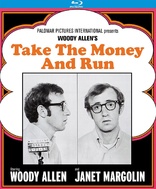Take the Money and Run Blu-ray Movie
HomeTake the Money and Run Blu-ray Movie 
Kino Lorber | 1969 | 85 min | Rated PG | Oct 10, 2017Movie rating
7 | / 10 |
Blu-ray rating
| Users | 0.0 | |
| Reviewer | 3.0 | |
| Overall | 3.0 |
Overview
Take the Money and Run (1969)
An incompetent criminal becomes the subject of a documentary.
Starring: Woody Allen, Janet Margolin, Marcel Hillaire, James Anderson (I), Lonny ChapmanNarrator: Jackson Beck
Director: Woody Allen
| Heist | Uncertain |
| Crime | Uncertain |
| Comedy | Uncertain |
Specifications
Video
Video codec: MPEG-4 AVC
Video resolution: 1080p
Aspect ratio: 1.85:1
Original aspect ratio: 1.85:1
Audio
English: DTS-HD Master Audio 2.0 Mono (48kHz, 16-bit)
Subtitles
English SDH
Discs
Blu-ray Disc
Single disc (1 BD)
Playback
Region A (B, C untested)
Review
Rating summary
| Movie | 4.5 | |
| Video | 3.0 | |
| Audio | 3.5 | |
| Extras | 0.0 | |
| Overall | 3.0 |
Take the Money and Run Blu-ray Movie Review
Reviewed by Brian Orndorf September 23, 2017Technically, 1969’s “Take the Money and Run” isn’t Woody Allen’s directorial debut. That distinction belongs to the dubbed farce, “What’s Up, Tiger Lilly?” However, what the second effort in a long, decorated career represents is Allen’s initial offering of pure silliness, taking his interests and timing as a comedian and film performer, and funneling it into a faux documentary about the life and times of a terrible crook. It’s the first shot fired in an early career what would go on to introduce several comedy classics, but with “Take the Money and Run,” Allen provides a raw form of cheekiness to come, showcasing early instincts to offer as many jokes as possible, fueling the endeavor on pure goofiness. It’s a joy to watch at times, even at its most exhausting, delivering a hungrier Allen at the start of his helming career, eager to please with this zany snapshot of criminal stupidity.
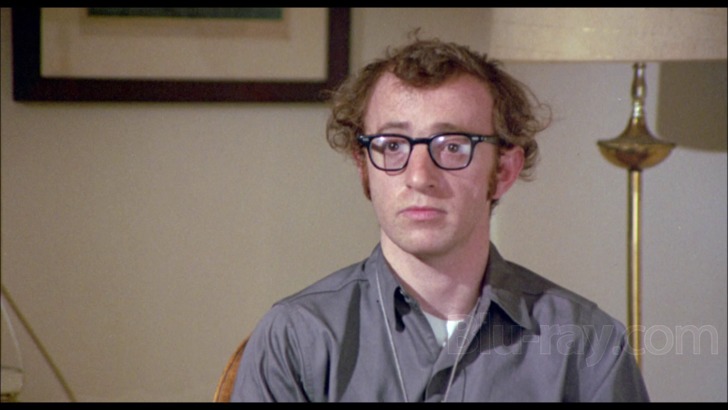
Bad news since the day he learned to walk, Virgil Starkwell (Woody Allen) has tried to achieve a level of criminal competence that’s always eluded him. Graduating from petty crime to bank robbery, Virgil tries and fails to steal a fortune, ending up in prison on multiple occasions, always lured into escape plans. Into his life comes Louise (Janet Margolin), a kindly laundress who believes Virgil’s lies about his work playing cello with the local orchestra. The two commence a tumultuous relationship that’s tested by Virgil’s inability to subdue his criminal urges, putting the couple at risk when he fails to secure traditional employment, tempted to restart his dangerous ways when money proves to be too difficult to earn honestly.
“Take the Money and Run” is structured as a documentary tracking Virgil’s rise and repeated falls, though Allen isn’t a particular stickler for the details of this storytelling approach, using it sparingly, breaking up the action with interviews with mental health professionals, experts, and even Virgil’s ashamed parents, who wear Groucho Glasses to conceal their identity (it’s that kind of movie). The documentary aesthetic permits Allen freedom to take Virgil’s journey anywhere he chooses, and the feature is engineered more for laughs than drama, putting characterization on the back burner while the production figures out how many gags it can stage with every location change. “Take the Money and Run” is extremely breezy entertainment, focusing solely on Virgil’s experiences with crime and punishment, and it never develops a narrative spine, leap-frogging around life events, which encourages slapstick, but doesn’t ground the effort in any sort of reality. This aerated approach is an acquired taste, and one Allen would go on to perfect in pictures such as “Sleeper,” “Bananas,” and “Love and Death.”
Virgil’s journey as a career criminal is littered with mistakes, beginning with childhood shenanigans such as the inability to remove his hand from a gumball machine he’s trying to crack open. As a young man, Virgil tries his luck as a pool shark without mastering the game, and there’s a brief chance at legitimacy with the cello, offering the picture’s best sight gag: Virgil trying to keep up with a marching band, repeatedly sprinting to position himself on a chair to play his instrument. “Take the Money and Run” is teeming with broad humor, and Allen doesn’t throttle the farce, giving himself entirely to any opportunity he can find, which is a major part of the movie’s appeal. It’s tireless in its quest to land punchlines or showcase monkey business, with Allen front and center, using his ace timing to sell goofy ideas, such as Virgil’s attempt to break out of prison using a gun whittled out of a bar of soap, finding his freedom cut short by a rainstorm, which turns his weapon into a sudsy mess.
Incarceration is part of the “Take the Money and Run” journey, with Virgil botching escape attempts and inmate camaraderie. There’s time for love as well, finding Virgil’s relationship with Louise inspiring clarity in the crook, but his self-destructive impulses remain, keeping his eventual wife in poverty as he tries to land a huge score and make their troubles disappear. Unfortunately, he has messy penmanship, as viewed in a hilarious sequence that has bank tellers and mangers trying to decode Virgil’s written promise of violence with a “gub” during an armed robbery.
“Take the Money and Run” hums along for an hour, throwing comedy fastballs in every direction, but the picture does tend to slow down in its last act. Virgil’s experience on a chain gang is the movie’s lengthiest detour, disrupting the flow of the effort to a slight degree, though the jokes contained within land successfully (e.g. Virgil and his fellow inmates try to remain inconspicuous while chained together during an escape). Allen sustains the energy of “Take the Money and Run” for long as he can, and without breaks, fatigue sets in. However, it doesn’t cripple the feature, which rebounds with wackier antics and an amusing appearance by Louise Lasser (Allen’s wife at the time), who portrays a daffy interviewee surprised that a dummy like Virgil could pull of any sort of crime.
Take the Money and Run Blu-ray Movie, Video Quality 
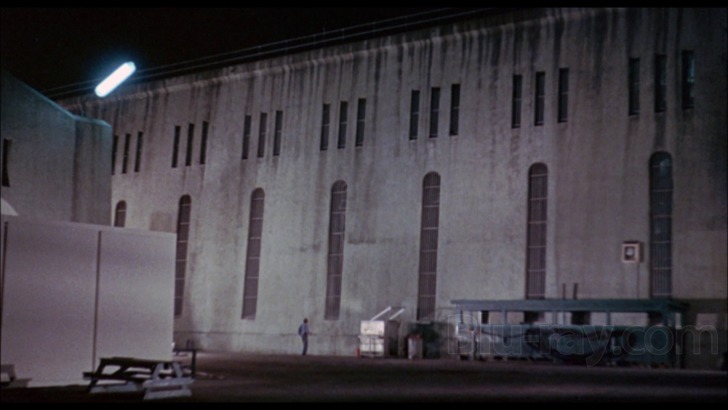
The AVC encoded image (1.85:1 aspect ratio) presentation appears to be an older scan, offering a dulled viewing experience for a film with an already limited visual reach. Detail doesn't come through, remaining soft, without compelling textures on facial particulars, even during close-ups. Distances are adequate, visiting various urban and rural environments. Color survives in "Take the Money and Run," but it's not an especially vibrant palette, showing life with period costuming and street signage, while more metallic and concrete locations retain their grim intent with minimal fade. Skintones are accurate. Delineation isn't ideal at times, but it's not problematic. Grain fluctuates throughout, lacking consistency. Source is in decent shape, without overt damage.
Take the Money and Run Blu-ray Movie, Audio Quality 
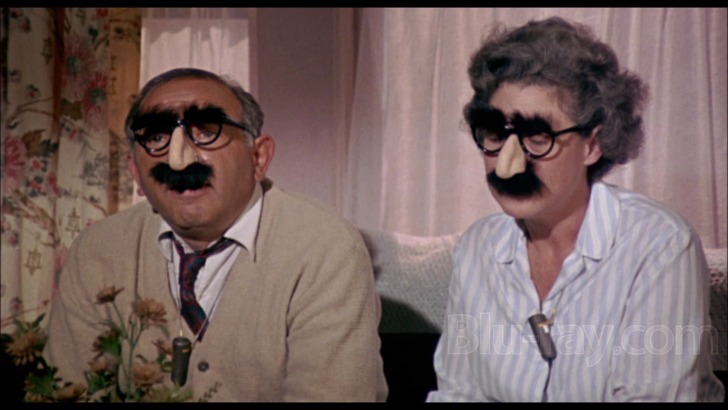
The 2.0 DTS-HD MA sound mix matches the feature's low-budget ambition, offering a straightforward listening event that emphasizes dialogue exchanges. Performances are preserved, often competing with loud manufacturing and urban sounds, coming through as intended. Music is appealing, with the jazzy score supporting on-screen activity, enjoying stable instrumentation and position. There are a few split-second audio dropouts scattered throughout the track.
Take the Money and Run Blu-ray Movie, Special Features and Extras 
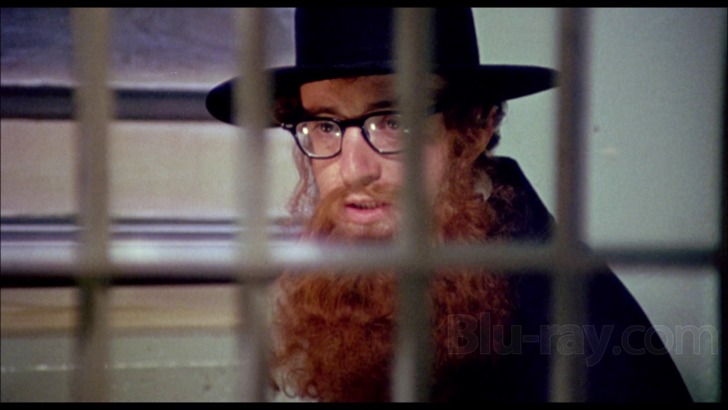
There is no supplementary material on this disc.
Take the Money and Run Blu-ray Movie, Overall Score and Recommendation 

The glue that holds "Take the Money and Run" together is the score by Marvin Hamlisch, who supplies a jazzy bounce to Virgil's antics, while also providing a cinematic stance to the effort, which always threatens to dissolve into scattered bits. Hamlisch even works in the famous "Soul Bossa Nova" during an escape sequence, giving the picture some musical sway. Allen needs some guidance here (the film was reportedly reshaped significantly by editor Ralph Rosenblum, who excised an ending where Virgil is shot to death -- quite the conclusion for a comedy), but the bulk of the viewing experience belongs to his special sense of humor, which always endeavors to find the silliest way to solve character problems. Allen has matured into a refined director over the last 50 years, but here, with "Take the Money and Run" and a few other productions, was his most freewheeling creative period, with his only mission being the stimulation of as many laughs as possible.
Similar titles
Similar titles you might also like

After the Fox
1966

Small Time Crooks
2000

White Heat
1949

Dead Heat on a Merry-Go-Round
1966

The Hot Rock
Limited Edition to 3000
1972

The League of Gentlemen
1960

Murder, He Says
1945

The Ladykillers 4K
1955

You Only Live Once
1937

The Lavender Hill Mob
1951

The Old Man & the Gun
2018

Hollow Triumph
The Scar
1948

Straight Time
Warner Archive Collection
1978

Crashout
Gunmen on the Loose
1955

What's New Pussycat?
1965

The Wrong Arm of the Law
1963

Fun with Dick and Jane
1977

Odds Against Tomorrow
1959

Bullets Over Broadway
1994

Thunderbolt and Lightfoot 4K
1974
